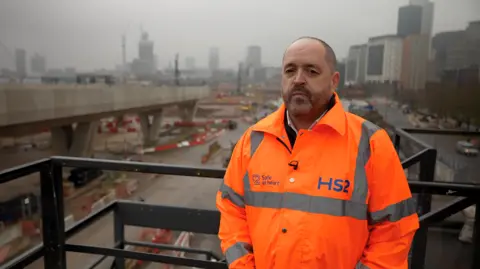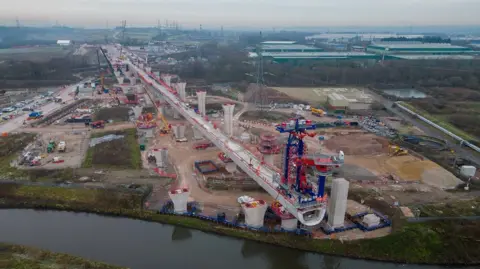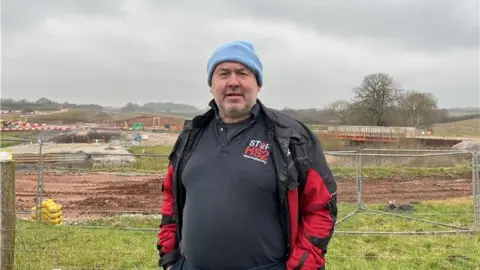HS2 construction 'at a peak' as viaduct finished
 BBC
BBCEfforts to construct HS2 have reached a peak with the completion of the first of 13 viaducts at a key rail junction, projects bosses said.
The 472m (516yd) single-track River Tame West viaduct has been built at the Delta Junction site near Water Orton, Warwickshire.
When all are completed, the 13 structures will take the railway over motorways, rivers, floodplains and local roads from London to Birmingham and on to Staffordshire.
"Momentum on HS2 is absolutely incredible at the moment," said Matt Young, the project's client director in the Midlands.
"On the civil engineering part of the project we're at peak construction; we'll stay at peak through 2025 and into 2026.
"We've got somewhere in the region of 30,000 people working on the project today, 10,000 here in the West Midlands."
 HS2
HS2The River Tame West Viaducts will carry three rail tracks and feature one single-track viaduct and one double-track viaduct.
A spokesperson for HS2 said work was underway on the double-track viaduct.
They are at the northern tip of the Delta Junction, a triangular section of railway which enables trains to run between London, Birmingham and the north of England.
"As we look forward to the spring… we're going to push an enormous box across the A46 in Warwickshire later in April," Mr Young added.
"I'm personally really excited about seeing the first breakout of the Bromford Tunnel...which will happen also in April."
'UK first' claimed in viaduct work
The viaduct was constructed in what HS2's contractor, Balfour Beatty VINCI, claimed was a UK first - using a giant cantilever structure to build it.
Cantilevers are beams supported only at one end but able to carry a load on the other end and the firm said it was used to move sections of precast concrete into place.
"It's an efficient and flexible process using cable stays from the cantilever structure to keep the viaduct in place, while a mast and swivel crane are used to place each segment in place," Nicolas Gallone, from Balfour Beatty VINCI said.
The technique will be used on eight of the further 12 viaducts, he added, with all the deck sections due to be in place by late 2026.

The 140-mile (225km) rail route started as a Labour project, announced in 2009 but has since been hit with setbacks and soaring costs.
Several parts of the initial route were scrapped including the link between Birmingham and Manchester and the Leeds leg.
The government's last estimate of the overall cost for the remaining Birmingham to London stretch was between £45bn and £54bn in 2019 prices - however, HS2 management estimated £49bn to £57bn.
The scheme also still faces fierce criticism from campaigners.
"When they first announced it, it was meant to be open in 2025 - it doesn't look like its going to be open any time soon," said Joe Rukin, campaign manager of Stop HS2.
"At every point, the cost has got worse, the delays have got worse, the environmental impact has got worse, the impact on communities has got worse.
"Even though it's a fraction of what was promised in the first place, it's still going to cost more, it's still going to be a decade late and for what cost? A cost not worth paying quite frankly."
He added he believed that people on the route who disagreed with the project were being blamed for planning delays.
In January, the Prime Minister, Sir Keir Starmer, announced plans to block campaigners from making repeated legal challenges to planning decisions for major infrastructure projects in England and Wales.
Thousands of planning consents still needed
"I acknowledge public concern about both the time and cost of the project. I think that it's been well advertised that we've now got a new CEO in the company, Mark Wild," said Mr Young.
"He's undertaking a deliberate review at the moment of both cost and the schedule for the project.
"So we look forward to seeing the outcome of that and that being approved by government in due course."
Mr Young added that, in the part of the project he was accountable for, he still needed to secure about 3,000 planning consents.
"To do that, I've got to go to seven different local planning authorities, I've got to go to numerous additional consent-granting bodies…and of course that takes time," said Mr Young.
"That's why, as an organisation, we welcome this government review into planning to support major infrastructure."
Follow BBC Birmingham on BBC Sounds, Facebook, X and Instagram.
